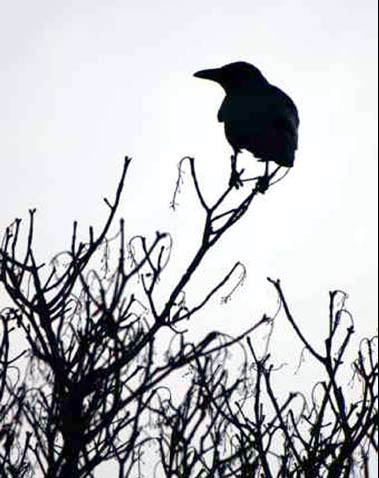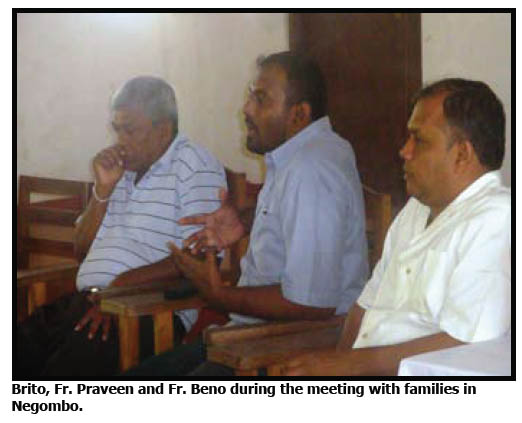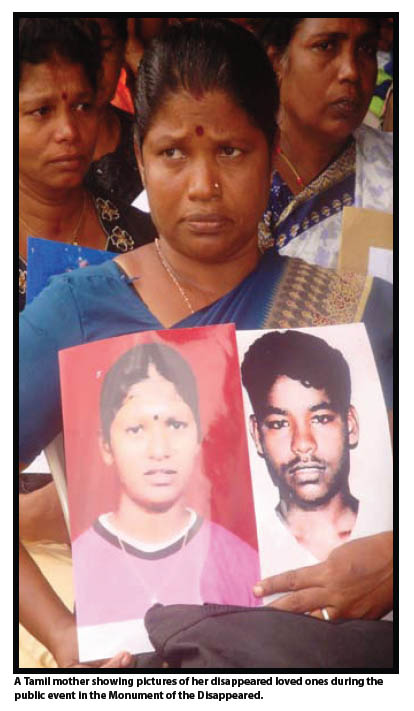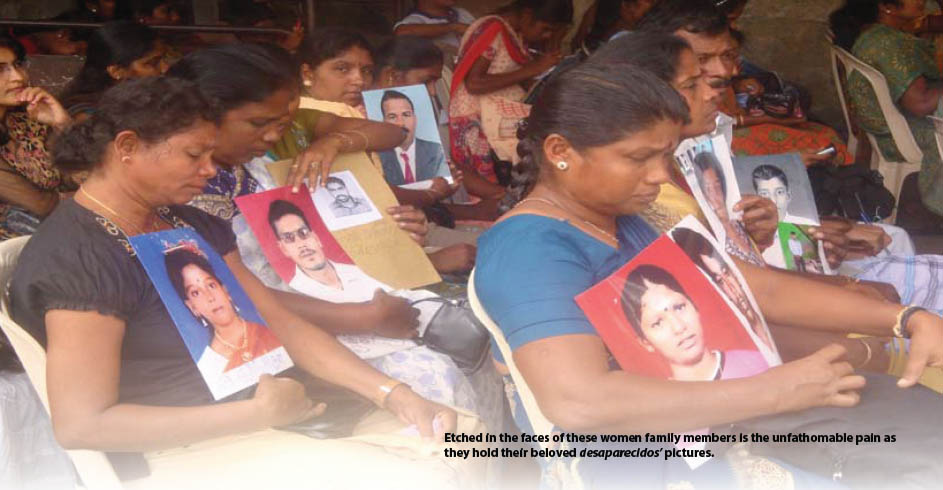Bird’s View in the Crows’ Nest: A Visit to Sri Lanka
by Darwin Mendiola
 Crows
are passerine or songbirds. They can communicate not only to their own
kind but also to others. They also have a mystical nature. Different
cultures usually associate a crow with death. Tale has it that when a
person dies, a crow carries his or her soul to the land of the dead. But
if the soul is disturbed, the crow can bring that soul back to put the
wrong things right.
Crows
are passerine or songbirds. They can communicate not only to their own
kind but also to others. They also have a mystical nature. Different
cultures usually associate a crow with death. Tale has it that when a
person dies, a crow carries his or her soul to the land of the dead. But
if the soul is disturbed, the crow can bring that soul back to put the
wrong things right.
I got a chance to have a close encounter with this bird when I joined
Ms. Mary Aileen Diez-Bacalso, the Secretary-General of the Asian
Federation Against Involuntary Disappearances (AFAD) in a lobby visit to
Sri Lanka from 25-30 October 2010. It was made possible through the
invitation of the Families of the Disappeared (FOD), which is now one of
the two newest member-organizations of AFAD.
As a regional human rights organization working on the issue of enforced
disappearance, AFAD has been doing lobby visits to different Asian
countries to get the support of Asian governments concretely by their
signature and ratification of the International Convention for the
Protection of All Persons from Enforced Disappearance (hereinafter
referred to as The Convention) and to urge them to take necessary
domestic measures that will address this global malady. This is in view
of the fact that Asia is the continent which has the highest number of
disappearances cases reported to the United Nations Working Group on
Enforced Disappearance (UN WGEID).
To note, Sri Lanka is historically and politically important to the AFAD
since one of its founding members, the Organization of Parents and
Family Members of the Disappeared (OPFMD) came from Sri Lanka. Moreover,
the prevailing phenomenon of enforced disappearance in this part of the
globe necessitates a regional response.
Before coming to Sri Lanka, my basic knowledge of the country’s
political situation was mainly in reference to the report of our
international networks and local contacts in which my article in the May
2009 issue of The Voice entitled, Sri Lanka: Human Rights Under Fire was
largely based. But what I know is just a tip of the iceberg and it is
different when one personally witnesses the avalanche of social reality.
Sluggish and heavy-eyed and feeling like falling vegetables, we arrived
in Sri Lanka after traveling almost 4,440 kilometers from the
Philippines via Singapore for more than 12 hours. I just remembered how
to breathe when we finally passed through the standard security check
and immigration clearance. Stepping out of an airport always gives me an
eerie sense of coming out from the coffin.
 After
going in and out of the airport looking for someone to fetch us, we
finally met Mr. Brito Fernando, the enthusiastic president of the
Families of the Disappeared (FOD) whom we happened to just pass by in
the arrival area but did not recognize. After the exchanges of
pleasantries, we immediately boarded a van that headed to the FOD office
and then to our hotel. Too tired and sleepy to stick one’s nose in the
conversation, I just looked outside the window to enjoy the scenery.
When the landscape dramatically changed from urban to pastoral view
after traveling for hours, I started to appreciate why Sri Lanka was
once called the island jewel of the Indian Ocean. I was fascinated when
I spotted the flocks of black birds flying and squawking in the sky as
if welcoming us. As I have learned from our host, house crows are so
common in Sri Lanka that they are often ignored. Sri Lankan authorities
have counted on them to help clear smelly garbage from the streets.
After
going in and out of the airport looking for someone to fetch us, we
finally met Mr. Brito Fernando, the enthusiastic president of the
Families of the Disappeared (FOD) whom we happened to just pass by in
the arrival area but did not recognize. After the exchanges of
pleasantries, we immediately boarded a van that headed to the FOD office
and then to our hotel. Too tired and sleepy to stick one’s nose in the
conversation, I just looked outside the window to enjoy the scenery.
When the landscape dramatically changed from urban to pastoral view
after traveling for hours, I started to appreciate why Sri Lanka was
once called the island jewel of the Indian Ocean. I was fascinated when
I spotted the flocks of black birds flying and squawking in the sky as
if welcoming us. As I have learned from our host, house crows are so
common in Sri Lanka that they are often ignored. Sri Lankan authorities
have counted on them to help clear smelly garbage from the streets.
But by just looking at them, I began to see life as naturally free and
simple. Suddenly, I remembered a poem that I have read a year ago from
the internet about the Crow. It was written by Gerry Legister a black
man from Yorkshire who saw the world from the eyes of the crow. It was
the poem’s insight that made me look at Sri Lanka from a bird’s view.
“With fascinating intelligence,
these crows could be the harbinger of death.
They did fly sublime in ancient meadows,
to bring food stolen from the last breathe.”
“Absolute power corrupts absolutely1.”
Mahinda Rajapaksa, championed the cause of the disappeared and other
victims of other forms of human rights violations when he was still in
the opposition. He spoke strongly against the atrocities committed by
the government to its people in the parliament, in the streets and in
international avenues. But when he rose to power, the promise of peace,
political reforms and economic development vanished. Much to the public
outrage, the Rajapaksa government is largely dominated by his family;
two of his brothers hold key executive positions, as defense secretary
and senior economic advisor to the president. It is the competition for
political power that becomes a vicious struggle to grab public wealth.
War is a cowardly escape.
Instead of pursuing a peaceful resolution of war against the Tamil
Tigers, Rajapaksa ordered the Sri Lankan army to intensify the military
offensives in the Tamil controlled territories after the peace talks
collapsed. The renewed military solution might have eventually ended the
26-yearlong civil war between the Sri Lankan army and the Liberation
Tigers of Tamil Eelam (LTTE), but it was the civilians who paid the
highest price. Civilian casualties were reported to have reached nearly
10,000, with some 3,000 deaths and over 7,000 injuries during the period
of military offensives. The warring parties were both attributed to
gross violations of human rights and humanitarian law. Not only lives
and pieces of property were senselessly destroyed by the war, it also
forcibly displaced thousands of people from their homeland. Even after
the war ended, people are made to suffer from lack means of subsistence
and of rebuilding their homes.
In war, truth is the first casualty.
Human rights situation remained a major concern even after the armed
conflict reached its conclusion. Extrajudicial executions and
disappearances continue unabated while past atrocities were never
investigated and perpetrators freely escaped from their
accountabilities. Majority of the victims are Tamils who ironically
constitute only 16 percent of the overall Sri Lankan population. While
the government claimed to have an effective control over the military,
human rights groups believed that paramilitary groups who are mostly
responsible for serious human rights violations are closely linked with
or working for the government.
“When the prophet would not go home,
by the river reconcile
to his astonishment,
crows arrived to his spiritual mourning,
crows rant and herald the missionary scent.”
On our second day, we went to a resident camp within Negombo area to
meet a group of families, mostly young Tamil mothers and wives from the
northern part of Sri Lanka, e.g. Jaffna, Manna and Batticalao who were
accompanied by two Catholic priests, Fr. Beno Alexander Silva, a parish
priest from Jaffna and Fr. Praveen Mahesen, director of the Center for
Peace and Reconciliation.
After briefly introducing ourselves and explaining to the families the
purpose of our visit, speaking in Tamil and translating to English, Fr.
Beno was telling the family that even if war made them all empty for
losing their loved ones, it however brings them together as one people
in God. He also said that it is very difficult to teach peace without
justice and that justice and peace are everyone’s mission. Those strong
words were like keys that opened even an embattled heart. One by one,
the family members started sharing their stories.
War does not determine who is right but who is left.
A 50-year old mother from Jaffna recounted the disappearance of her son
on 11 September 2008 when unidentified armed men came to her house
looking for someone they did not know. But when armed men could not find
the person, they took his son instead. The families immediately reported
the incident to a nearby police station but the police told them to go
and find their missing relative somewhere else.
 A
teary-eyed and desperate 30-year old wife and a mother of two children
from Manna also related to us how her husband disappeared on 27 December
2006. She was told by a witness that her husband was seen riding a
motorbike with a friend when they were stopped by military men on the
road. Her husband did not return home that day and remains missing until
now.
A
teary-eyed and desperate 30-year old wife and a mother of two children
from Manna also related to us how her husband disappeared on 27 December
2006. She was told by a witness that her husband was seen riding a
motorbike with a friend when they were stopped by military men on the
road. Her husband did not return home that day and remains missing until
now.
Another story of personal loss and grief was recounted to us by a
41-year old mother from Manna whose 15 -year old daughter disappeared
during the war on 19 May 2009. She told us that when the military
started bombing their homeland, her daughter was injured by shelling and
they were forced to leave their homes. They brought their daughter to a
nearby hospital and left her to continue their way to the refugee camp.
After several days, they came back to the hospital only to find out that
their daughter was no longer there. Witnesses told them that their
daughter was brought in the army camp outside Manna. They searched for
her but to no avail. Her husband is now sick and cannot anymore
accompany her in the search for their missing daughter.
A 49-year old father also took his turn to tell us about the
disappearance of his 19-year old son. He narrated that his son was
forcibly taken by the LTTE in 2006 and recruited as a combatant. During
the war, witnesses said that they saw his son in the hospital
recuperating from a leg injury. But when they went to the hospital, the
military did not permit them to see his injured son. After several days,
they returned to the hospital and nurses told them that their son was
already transferred by the military. Until now, they do not know where
he is.
These are just few stories of tragedy indelibly marked in the pages of
Sri Lanka’s bloody history of war. Most of these stories have never been
told, yet the pain and sufferings are already known.
“They see the hunger of emptiness inside,
and try to understand the bigger challenge,
trying to hide with self consumed pity and pride.
Crows don’t ask for sympathy for being strange.”
War is not just a story of suffering but also a tale of courage.
On the same day, we traveled for almost two hours from Negombo to
Colombo to attend FOD’s 20th annual commemoration together with Mr.
Ewoud Plate of the Aim for Human Rights, The Netherlands, who just
arrived that day to join us.
With the theme, “Forced Disappearance is a crime against humanity.
Let us not allow it to happen again,” the event had drawn
together more than 300 people coming from the diplomatic community,
opposition parties of the Parliament, churches, civil society
organizations, media and families of the disappeared both from the north
and the south.
The FOD has been, for years, trying to rally all stakeholders to
pressure the government to respect and protect human rights of the Sri
Lankan people, both Sinhalese and Tamil. They believe that the
government has an undeniable moral responsibility to stop the political
violence that sows fear and undermining the rule of law in the country.
The activity was meant to create a political consensus on this national
issue and to come up with concrete actions to make it as an issue of
conscience to all people.
Mr. Ewoud Plate was asked to present salient points of the Convention
while Ms. Mary Aileen Bacalso was requested to discuss the phenomenon of
enforced disappearances in Asia, the work of AFAD, the status of the
Convention and the challenges to the Sri Lankan government and civil
society.
Ms. Sindaya Ekanaliyagoda, wife of the disappeared journalist, Pregeeth
Ekanaliyagoda abducted on 24 January 2010 was also there to speak about
her husband’s disappearance. She believed that what happened to her
husband is an affront to the freedom of the press. She said that even
members of the media are no longer safe and that anyone can be the next
victim of enforced disappearance by those whose power and interests are
threatened by people working for the truth.
Several speakers from members of the Parliament and civil society also
expressed sympathy to and solidarity with the families of victims and
committed their support for the UN Convention for the Protection of All
Persons from Enforced Disappearance. They all agreed to take part in any
actions that can make the government responsive to the cry of victims
and their families for truth and justice.
The activity culminated with the signing of a pledge of commitment of
the delegates, launching of FOD’s newest publication and the candle
lighting ceremony as tribute to all Sri Lankan desaparecidos.
Moving on is not forgetting but living life in memory of the past.
On the following day, we joined FOD in their commemoration of the
National Day of Disappeared at the junction of Raddoluwa (Seeduwa),
Western Province. Hundreds of people including relatives of the
disappeared in Sri Lanka from the north and eastern provinces, gathered
at the monument in memory of their sons, husbands and children. The
memorial - a sculpture of a human figure - was erected in 2000. Behind
the statue, there is a wall where the families of the disappeared put
flowers under the photos of their loved ones. The annual day of
commemoration has become an occasion for many families from all parts of
the country to gather and reflect on the problem of disappearances.
An ecumenical service led by a Buddhist monk, Catholic priest and Muslim
imam was performed in order to implore God’s presence and mercy upon the
families by giving them courage to go beyond the pain of losing their
loved ones and to continue their quest for justice.
Different speakers representing the government and civil society also
paid tribute to the tens of thousands of disappeared Sri Lankans who, if
ever they were killed, have neither date nor place of death, neither
body to bury nor grave to light candles. They shared the same call to
the current government to prevent the recurrence of enforced
disappearances, clarify Sri Lanka’s history of large-scale
disappearances, and end impunity of those responsible for this
horrendous crime against humanity. Speaking in Sinhala, Brito Fernando
posed a challenge to the public, saying: “It is an opportune moment
for all us to open our eyes to the reality that surrounds us. Our
society is battered by injustices. The phenomenon of continuing killings
and disappearances is pushing us to stand up for the oppressed and the
disappeared. So, I ask you all to hold hands and work together to
achieve a just society that we all long for.”

We went back to Negombo after the commemoration activity to attend a
meeting between civil society and the victims’ families. Here, the
sharing of stories continued. We showed our new documentary video “Unsilenced.”
Before presenting the video, I was asked to discuss briefly its content.
It is about the disappearance of six paper factory workers who were
abducted at gunpoint on 14 October 2000 by members of the Philippine
military and its landmark legal victory two years ago, in the conviction
of one of its perpetrators as accessory for kidnapping and serious
illegal detention. When the presentation ended, I saw tears in the eyes
of the families. I realized that unspoken pain is better understood by
the heart.
“Where they nest and what they eat,
Other birds watch silently in disbelief,
The dark creature’s lover of stale meat,
Cherished the indifference of what is left.”
To fly high and battle the wind is
the only way to clearly see the rising sun...
Politics is nothing more than the continuation of war by other means.
On our third day, we had to travel again to Colombo to meet the leader
of the opposition, Mr. Ranil Wickramasinghe who is the head of the
United Nationalist Party (UNP). The UNP is allegedly responsible for the
thousands of disappearances between the periods of 1987 to 1991 when the
party was still in power. Since then, none of the succeeding
administrations have taken steps to ensure that justice is rendered for
past atrocities. After waiting for a couple of minutes, we were granted
audience with this party leader who showed indifference to our appeal
for the opposition to take on the pivotal role of convincing the
government to support the UN Convention for the Protection of All
Persons From Enforced Disappearance.
He simply ranted us with the typical litany of being supportive to the
cause but the party could not do much as it only comprises the minority
in the parliament. It was Brito Fernando who even suggested that the
opposition uses its privilege motion to challenge the ruling party to
table the issue through a resolution. The UNP leader simply agreed
without showing any commitment. Our hope for winning more champions for
the cause eroded as quickly as the meeting ended.
We went back to Negombo to have a meeting with the staff members of FOD
to formally discuss the latter’s membership application in AFAD and to
explore future cooperation. With FOD as then incoming member of AFAD, we
were reassured that something can be done to bring the issue of enforced
disappearance into a national discourse.
“Happily in the graveyard in no man’s land,
crows are found all over the world.
Carrying the mantel of raven,
dumpster dining where humans fear to tread.”
There is great meaning in life for those who are willing to journey.
On our last day in Sri Lanka, Ewoud, Aileen and I decided to have a
little break by going to a nearby beach which is about 5 -minute drive
from our hotel riding a “tuk tuk”, a tri-wheeler passenger bike.
While taking some pictures, I suddenly sensed that there were eyes
watching me. Following my instinct, I looked up and saw again the flock
of crows flying and squawking in the sky as if conveying a message in
the language of the unspoken word.
When we returned to our hotel to prepare our things, I was still
dumbfounded. But reason told me that our senses are sometimes deceiving
and that I should just shake my head to fasten some loose bolts.
Aileen and I left for Colombo in the afternoon to meet an old friend and
former member of AFAD while Ewoud went with Brito to Kandy, the hill
capital of Sri Lanka. After saying goodbyes and parting ways, I was
still preoccupied with my mystic experience of encountering the crows.
After spending sometime in Colombo to buy pasalubong (presents),
we went straight to the airport to catch our flight without realizing
that we already missed it because our flight schedule was actually in
the morning. Troubled and confused but driven by our impatience to go
home, we decided to buy new tickets and make new flight arrangements.
Before walking back to the departure area, I once again saw the flock of
crows flying and squawking in the sky as if saying goodbye. It was then
that I finally grasped what they wanted to tell me all along: that our
journey towards a peaceful, just and humane world is not yet over.
To fly high and battle the wind is the only way to clearly see the
rising sun.
Note:
1 The phrase is borrowed from a letter
dated April 1887 written by John Dalberg-Acton, 1st Baron to scholar and
ecclesiastic, Mandel Creighton.

Darwin Mendiola is currently the Philippine Advocacy Project Coordinator
of the AFAD. He has worked in various non-government organizations that
engage the Philippine government in formulating and implementing policy
reforms and institutional changes. Darwin is a former media liaison of
the Laban ng Masa (Struggle of the Masses), a new Philippine Left
Coalition under the leadership of exUP President, Dr. Francisco Nemenzo,
Jr. As a former student leader in the Polytechnic University of the
Philippines in the early 1990s, he remains an activist in his own right.